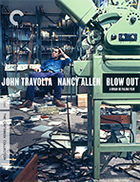Blow Out (4K UHD)
|  Brian De Palma’s engrossing political thriller Blow Out capped off the auteur’s most consistently fertile artistic period, which arguably started with his first full dive into Hitchcockian horror with Sisters (1973). Between those two films, he made the campy rock musical Phantom of the Paradise (1974); the Vertigo-esque Obsession (1976) from a script by Taxi Driver’s Paul Schrader; the superior Stephen King adaptation Carrie (1976), which still ranks as one of the most honest and horrifying portraits of adolescent angst ever committed to film; the taut supernatural thriller The Fury (1978); the Godardian farce Home Movies (1980), which is often passed off as a failure, but can’t be fully dismissed; and, of course, the controversial Dressed to Kill (1980), his stylishly brilliant send-up of suspense and horror conventions that is also extremely suspenseful and often vary scary. The key to Dressed to Kill was its comedic subtext—essentially the manner in which De Palma played with the inherent outlandishness of it all (there is reason that New Yorker critic Pauline Kael, one of De Palma’s most fervent admirers, referred to so many of his films as comedies). With Dressed to Kill, he perfected the art of the ironic thriller, so the only thing left to do was make one that was absolutely straight, which is what he does with Blow Out. Moreso than any of his previous films, Blow Out is a serious investigation of political morality and individual angst in the face of overwhelmingly corrupt institutions. It didn’t play well during its initial theatrical release in the early 1980s because audiences wanted to put paranoia and corruption in their rearview mirror and instead look forward to the dawning of Ronald Reagan’s “Morning in America.” With its obvious debts to both Michelangelo Antonioni’s existential whodunit Blow-Up (1966) and Francis Ford Coppola’s slow-burn surveillance thriller The Conversation (1974), Blow Out came too late for its own good, but its temporal dissociation from America’s most intense period of self-scrutiny and self-loathing in no way detracts from its power. If anything, unmoored from the specifics of that era, it plays even better, now working as an all-encompassing riff on the impossibility of tackling deep-seated corruption. John Travolta, who at the time was at the height of his post-Saturday Night Fever and Grease stardom, plays Jack Terry, a sound mixer for a low-budget exploitation outfit working from the second floor of a seedy building in downtown Philadelphia. As played by Travolta, Terry is affable and engaging; not a trashy soul, but rather one who hasn’t quite found his purpose in life. He is, in every sense, a man in need of a mission, which he gets when he witnesses the titular blowout on a bridge while recording sounds for a tawdry slasher movie. The car whose tire blows out careens into the river, and Terry is able to jump in and save a young woman named Sally (Nancy Allen). The man in the car, who just so happens to be a major Presidential candidate, drowns, and Terry quickly finds himself in the midst of a massive political cover-up that requires him to “forget” the girl was ever in the car. The real problem, though, is that Terry is sure he heard two bangs, the first one being a gunshot. Thus, he is convinced that the Presidential candidate didn’t die by accident, but rather by assassination. In his own clever way, De Palma merges the visual obsession with “truth” in Antonioni’s film with Coppola’s emphasis on technological dexterity. David Hemmings’s morally vacant Thomas in Blow-Up finds nothing but distortion and abstraction the more he looks into a photograph in which he believe he inadvertently captured a murder, while Gene Hackman’s fearful Harry Caul in The Conversation is able to manipulate his audio equipment with such precision that he can draw out exact words, but tragically reaches the wrong conclusion about their significance. The most engaging sequence in Blow Out plays on these ideas as Terry cuts together individual still images of the car crash that were taken by a sleazy con artist (Dennis Franz) and then synchs the images to his soundtrack, essentially “proving” that the gunshot took place. The problem is that no one wants to believe him, and both he and Sally are targeted by a professional hitman (John Lithgow) who is knocking off other curly-haired women so his killing of Sally will look like only one in a string of serial murders. Working again with composer Pino Donaggio (who had previously scored Carrie, Home Movies, and Dressed to Kill), albeit this time in a much lower register, De Palma keeps the tension in Blow Out consistently amped, which reminds us that all the harping about his being a “Hitchcock hack” is fundamentally irrelevant when the work is this good. Travolta’s performance is one of his finest; engaging and unshowy, he makes Terry into a remarkably fluid everyman whose desperation becomes ours (De Palma fills in the gaps with his roving camera and multi-focus wide shots, which overwhelm us with visual information and draw us into Terry’s emotion, as when the camera swirls and swirls around a room as he discovers that all of his tapes have been mysteriously erased). Travolta’s star persona couldn’t be ignored, especially at the time, which is what makes De Palma’s ending so tragically perverse. As a product of a paranoid mindset that can’t imagine individual triumph against a deck stacked so high, Blow Out is an ideological downer, but De Palma orchestrates it with such verve and such raw emotion that he literally boils our blood. The final moments of Blow Out are among the most shocking and powerful of De Palma’s oeuvre, tacking a final note of brutal irony into a story that is, in every other way, a straightforward denunciation of power run amok.
Copyright © 2022 James Kendrick Thoughts? E-mail James Kendrick All images copyright © ????? | |||||||||||||||||||||||||||||
Overall Rating: 


 (4)
(4)


